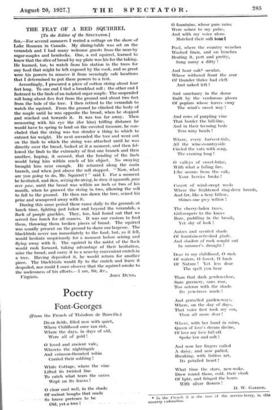THE FEAT OF A RED SQUIRREL
[To the Editor of the SPECTATOR.]
Sra,—For several summers I rented a cottage on the shore of Lake Rosseau in Canada. My dining-table was set on the verandah and I had many welcome guests from the near-by sugar-maples and hemlocks. One, a red squirrel, learned to know that the slice of bread by my plate was his for the taking. He learned, too, to watch from his station in the trees for any food that might be left exposed by the cook, and so great were his powers to remove it from seemingly safe locations that I determined to put these powers to a test.
Accordingly, I procured a piece of cotton string about four _feet long. To one end I tied a breakfast roll ; the other end I fastened to the limb of an isolated sugar maple. The suspended roll hung about five feet from the ground and about two feet from the bole of the tree. I then retired to the verandah to watch the squirrel. From the ground he climbed the body of the maple until he was opposite the bread, when lie stopped and reached out towards it. It was too far away. Then measuring with his eye the (for him) trifling distance lie would have to spring to land on the coveted treasure, he con- cluded that the string was too slender a thing to which to entrust his weight. He next ascended the tree and went out on the limb to which the string was attached until he was directly over the bread, looked at it a moment, and then fol- lowed the limb to the extremity of first one branch and then another, hoping, it seemed, that the bending of the limb would bring him within reach of his object. No swaying brought him near enough. He returned along the main branch, and when just above the roll stopped. Now, what are you going to do, Mr. Squirrel ? " said I. For a moment lie hesitated, and then, seizing the string, he drew it upwards, paw over paw, until the bread was within an inch or two of his mouth, when he gnawed the string in two, allowing the roll to fall to the ground. He then ran down the tree, seized his prize and scampered away with it.
During this same period there came daily to the grounds at lunch time, lighting just below and beyond the verandah, a flock of purple grackles. They, too, had found out that we served free lunch for all corners. It was our custom to feed them, throwing them broken pieces of bread. The squirrel was usually present on the ground to share our largesse. The blackbirds never ran immediately to the food, but, as it fell, would hesitate suspiciously for a moment before seizing and flying away with it. The squirrel in the midst of the flock would rush forward, taking advantage of their hesitation, seize the bread, and carry it to a near-by convenient crotch in a tree. Having deposited it, he would return for another piece. The blackbirds would fly to the crotch and leave it despoiled, nor could I once observe that the squirrel awoke to the uselessness of his efforts.—I am, Sir, &c.,


































 Previous page
Previous page